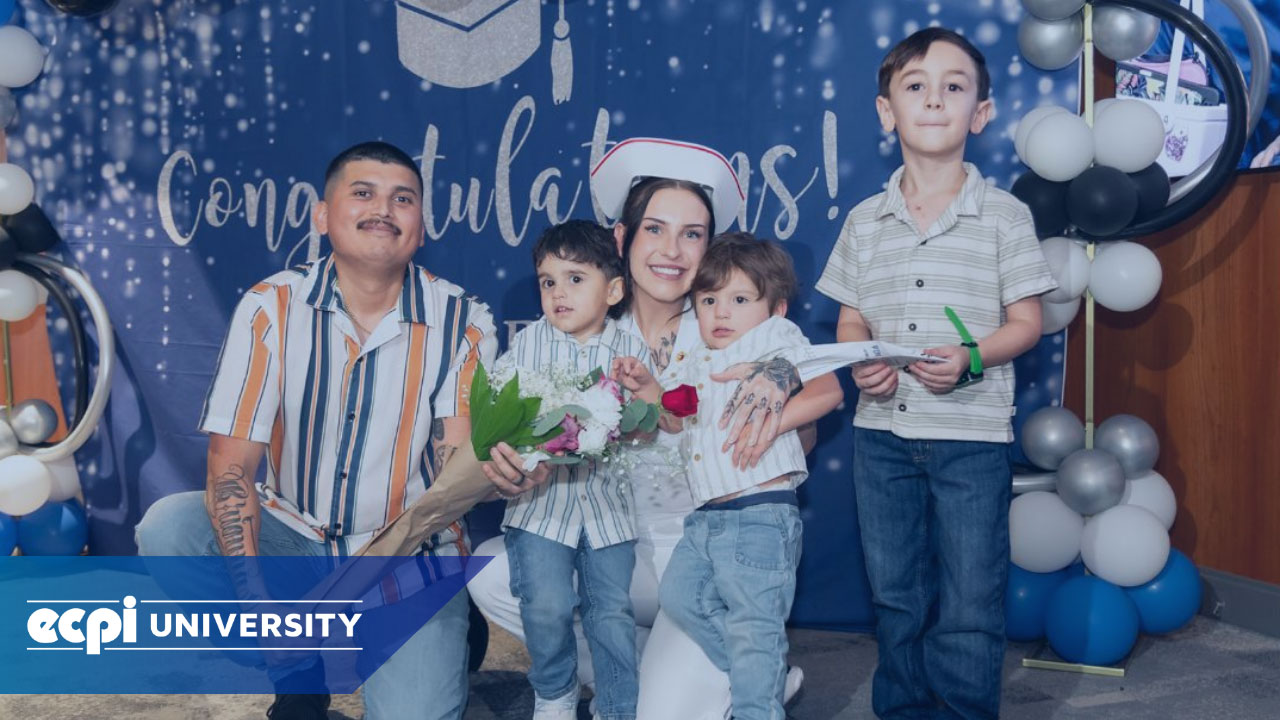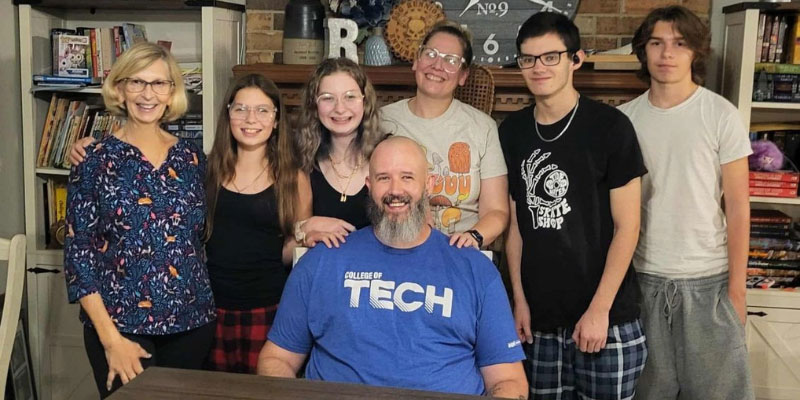
This piece was co-authored by Sarah Campo, ECPI University’s Director of Alumni Engagement, and Shanna Campise, ECPI University’s Director of Student Support Services.
Sarah shares the voices and journeys of student parents who have pursued their education while raising families, while Shanna highlights the services and support systems that help make their success possible. Together, they shed light on the challenges and triumphs of balancing school, parenting, and life.
It was another morning in yet another house that wasn’t hers. Lillian Van Pier moved about, straightening the crooked furniture, collecting the tossed-about toys, and maneuvering around the endless litter of “cat stuff everywhere.” The thought of her infant son made her pause.
“This isn't what I want to do with my life,” she spoke to a quiet room. Though he was still too young to walk, she wanted to leave him steps that he could follow.
Like most student parents, Lillian's path in higher education stopped at an associate's degree. Motherhood demanded her full attention, so the idea of even entertaining a bachelor’s degree never crossed her mind.
When she made the resolve to finally pursue one, she researched her options, guided by an early interest in coding. The name that repeatedly appeared in her search was ECPI University.
One day, she decided to fill out an inquiry form. Within the hour, she was on campus, sitting across from an admissions representative. He identified her strengths and interests, and together they mapped out her next steps.
An hour later, she walked out of the admissions office holding a list of courses she would be taking and anticipating a call to schedule orientation.

Lillian Van Pier with her son
A National Look at Student Parents
Lillian’s story is unique, but her newfound status as a student parent is not. In fact, she is one of 3.14 million student parents in the United States today, representing about 18 percent of all undergraduates.
Here at ECPI University, Lillian counts herself among an even larger share of that group: one in four of our students is a parent.
Like Lillian, most student parents gravitate towards shorter-term credentials like certificates or associate’s degrees. This stems not from a lack of ambition but rather a preference for practical pathways. Responsibility is ultimately the figure on their shoulder that sways their decisions.
And for those who do set their sights further, circumstances don’t always allow them to see things through. In 2010, Megan Cannon and her husband were both enrolled at EPCI University while raising their daughter. Though they had planned to advance their careers, his sudden passing prompted Megan to defer her education.
Megan spent the next 13 years working and raising her daughter as a single mother. After finding some stability in her life, she revisited her deferred goal and re-enrolled at ECPI University.

Megan Cannon with her daughter
With life’s unexpected turns, many students find themselves raising children on their own. Single parents make up a disproportionate share of the student parent population. This reality only deepens the many challenges that student parents face.
A Question of Time Poverty
Megan's story shows that it’s never too late to seek higher education. Nevertheless, the question of time looms large for student parents. Time poverty remains one of the main challenges they contend with, even before they enroll.
Students who are at least 25 years old are considered adult learners; 88% of student parents fall into this category. The average age of an ECPI student is 29, and most have already had some experience in higher education.
Having already built families, student parents can face steeper challenges than their non-parenting peers. Their cost of attendance is estimated to be two to five times higher, and they are 15% more likely to experience basic needs insecurity. Many also lack a means of reliable or adequate childcare and must manage on their own. Between full-time work and parenting, little time remains to invest in personal endeavors.
Undergraduate classes at four-year institutions tend to follow a day schedule. This doesn’t work for student parents like Megan who have other obligations during available class hours. With the incompatible schedules, some find their answer at higher education institutions that offer more flexibility or online learning options.
In a hectic lifestyle, finding small pockets of consistency provides a sense of stability. However, life with a child is anything but predictable.
Beyond scheduling conflicts, student parents also think carefully about how to make the most of their limited time. One challenge in higher education is that traditional programs can place a stronger focus on theory, while employers are often seeking graduates who are ready to step into practical roles.
This does not make the classroom experience less valuable, but it does mean that many students hope for more opportunities to connect what they are learning with what they will be doing on the job. Building those applied skills takes time, and for parents managing busy lives, that time is especially precious. Programs that combine academics with hands-on learning can help bridge this gap and give students both knowledge and confidence as they move toward their careers.
Daniel Runnion, a 38-year-old veteran and father of four, understood this very clearly. He knew the pressures of limited time. A self-described “tinkerer,” a hands-on accelerated program was essential in his decision to enroll at ECPI University.

Daniel Runnion with his family
Even with time constantly working against them, student parents continue to find means and reasons to persist.
What Moves Student Parents Forward
Higher education is already a high-stakes, high-pressure environment, and juggling parenthood only heightens the demands. Faced with mounting challenges, student parents are twice as likely to leave without obtaining a degree or other credential.
Nevertheless, their motivation surpasses that of non-parenting students. This is because student parents carry more than their own hopes and dreams. A common catalyst that propels parents to enroll is the desire to provide a better life for their children. These provisions, however, are not entirely material.
In many families, a college degree is a momentous milestone. More than half of all undergraduates in the United States are first-generation. At 35, Daniel became the first in his family to obtain a bachelor’s degree. His was not only a personal achievement but a new open door for his family.
The desire to serve as a role model for their children is one of the most powerful motivators for student parents. As Megan can attest, few things are as meaningful to parents as the look of pride in a child’s eyes.
In February 2024, Megan stood before an intimate gathering of faculty, classmates, and family members. Her classmates had chosen her to give the graduation speech at their nurse pinning ceremony. Through her words, she carried not just her own voice but all of theirs. In the audience, her teenage daughter watched intently, soon to begin her own college journey.
Finding Systems of Support
We often see the power of motivation and determination in student parents’ educational journeys. Despite their immense willpower, shouldering such a heavy burden alone is an overwhelming challenge. This is why providing appropriate systems of support is essential.
Student parents face unique challenges as they balance academics, childcare, work, and household duties. For them, these responsibilities are inextricable. And for single parents who have no partner to share in the work and no other means of support, the burden is even greater.
To meet these challenges, student services must take a holistic approach. Support must extend beyond academics to include conversations about home life, family guidance, and overall mental health and well-being.
This is where comprehensive student services make the difference. Our role is not only to connect learners with academic resources but to help them access support for their households, whether that means elder care, legal services, wellness programs, or childcare guidance.
Our students have found success with several programs that we offer. WellConnect gives students and their household free, confidential support to navigate personal, legal, and financial challenges. Career Services offers guidance with résumés and cover letters while equipping students with tools for ongoing professional development.
We also work with students to navigate seasonal shifts, such as when children are home during the summer. During these times, parents may struggle to maintain their routine or carve out quiet study hours. By being flexible and understanding, we help them stay on track and keep the momentum in their studies.
However, professional support alone can feel distant. Because we are social by nature, establishing support with peers and instructors is just as important. We often hear about the traditional “college experience” that seems like one of life’s common chapters. This may seem unattainable at accelerated or online colleges, but with our unique structure, developing that sense of community is still very much possible.
Our student-to-faculty ratio is 12 to 1, which is smaller than the national average. This allows instructors to give more individualized attention to each student. In addition, students progress through a consistent program path, often alongside the same cohort. This structure makes it easier to build camaraderie and establish lasting connections.
Ultimately, student parents need more than encouragement; they need systems of support that reflect the realities of their lives. By meeting them where they are, we can help them succeed in both school and family life.
Life Beyond Graduation
The impact of determination and support systems does not end at graduation. For many student parents, earning a degree merely lays the groundwork for what comes next. With renewed confidence, they step into a new chapter of their lives.
After a 13-year military career, Daniel landed his dream job as a network engineer at a service-disabled veteran-owned small business.
After 18 years as a medical assistant, Megan is a registered nurse in the emergency department at Sentara Hospital.
And Lillian, who three years ago made a living cleaning other people’s houses, now works as a sustainment engineer for the military.
But all three are far from finished. Megan hopes to pursue a master's degree in the future. Daniel has committed himself to earning his master’s degree, with the goal of one day teaching alongside his former instructors. And Lillian is actively working towards her master’s in cybersecurity policy at EPCI University.
Their journeys remind us of the true grit behind every parent. As they shape their own futures, they set an example of perseverance and possibility for their children.
Lessons for the Future
The stories of these three alumni show us that while each journey is unique, the struggles that student parents face are often shared. Their lives are ones of progress, resilience, and transition. Time keeps moving forward, and so do they.
When asked what advice she has for parents wrestling with uncertainty, Megan offered two simple words: Just start.
About the Authors: Sarah Campo and Shanna Campise
Sarah Campo is the Director of Alumni Engagement at ECPI University. She is passionate about sharing graduate stories, celebrating their achievements, and building meaningful connections that continue beyond graduation.
Shanna Campise is the Director of Student Support Services at ECPI University. As a first-generation college graduate, she understands the challenges of navigating higher education and the importance of feeling supported along the way. She is passionate about empowering students to overcome obstacles, build confidence, and achieve their goals while promoting overall mental health and well-being.

